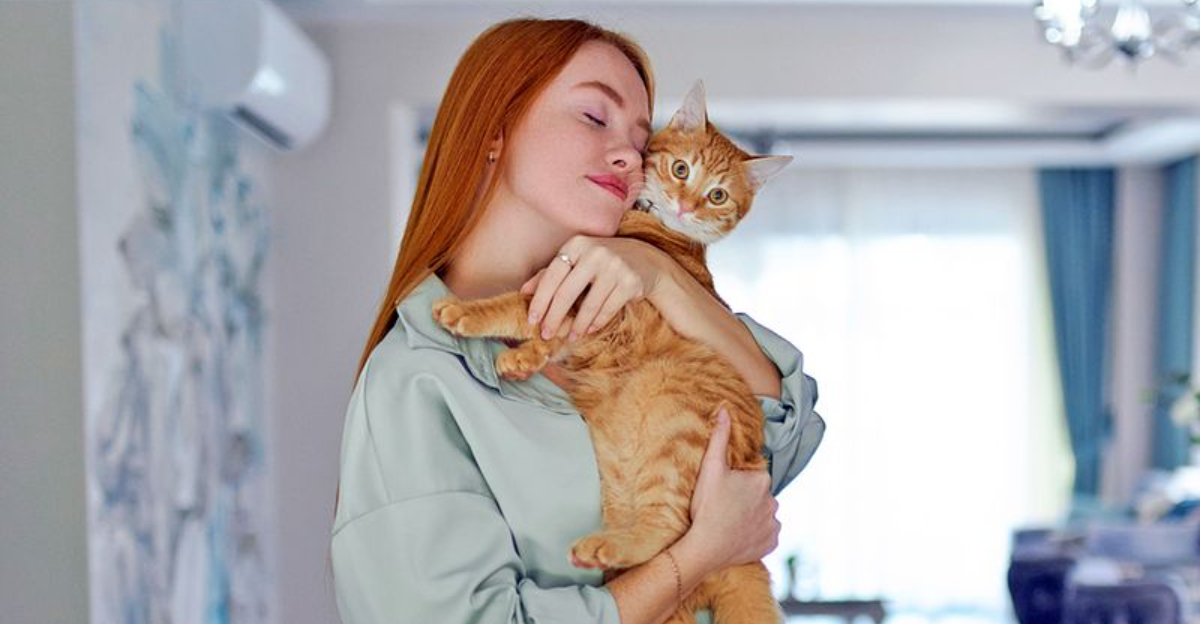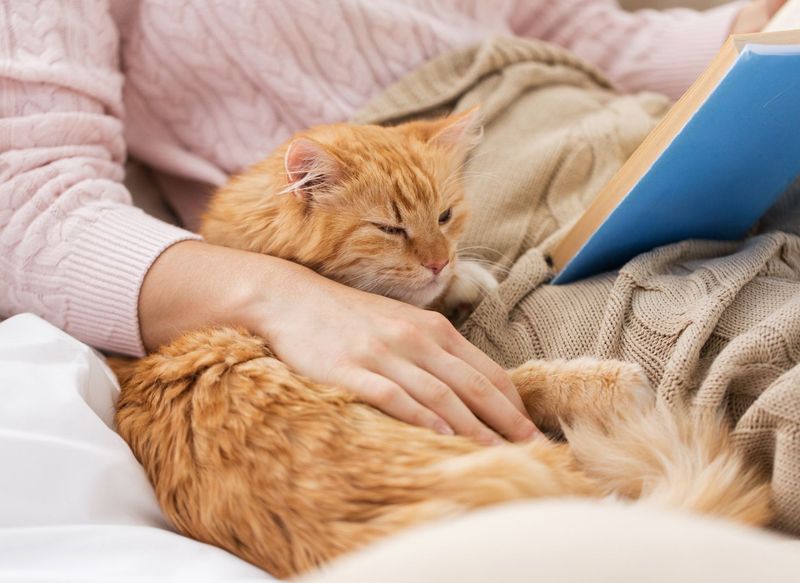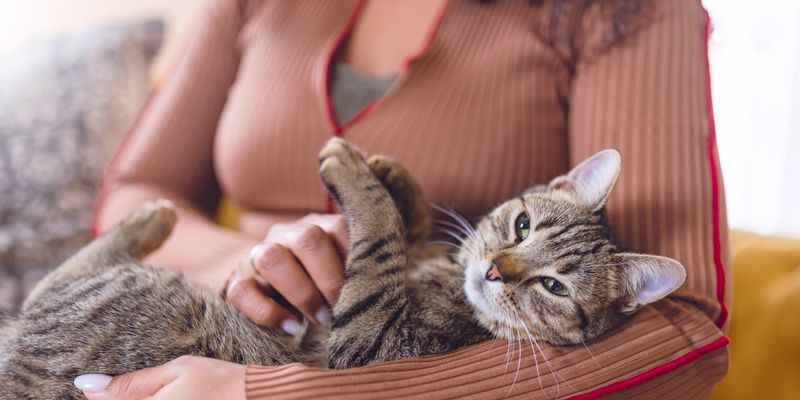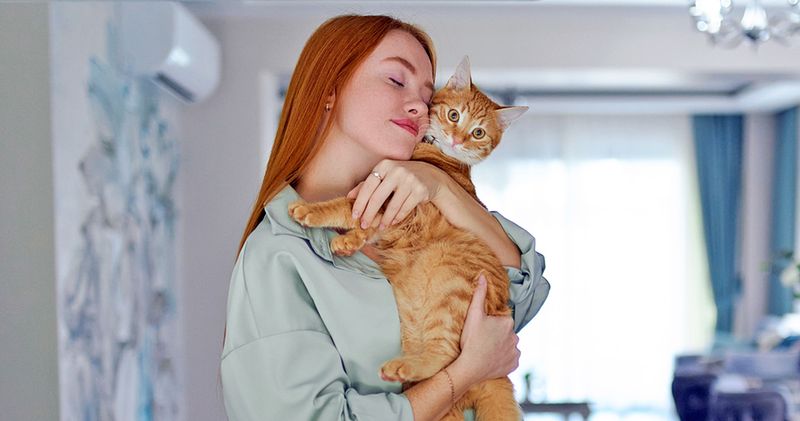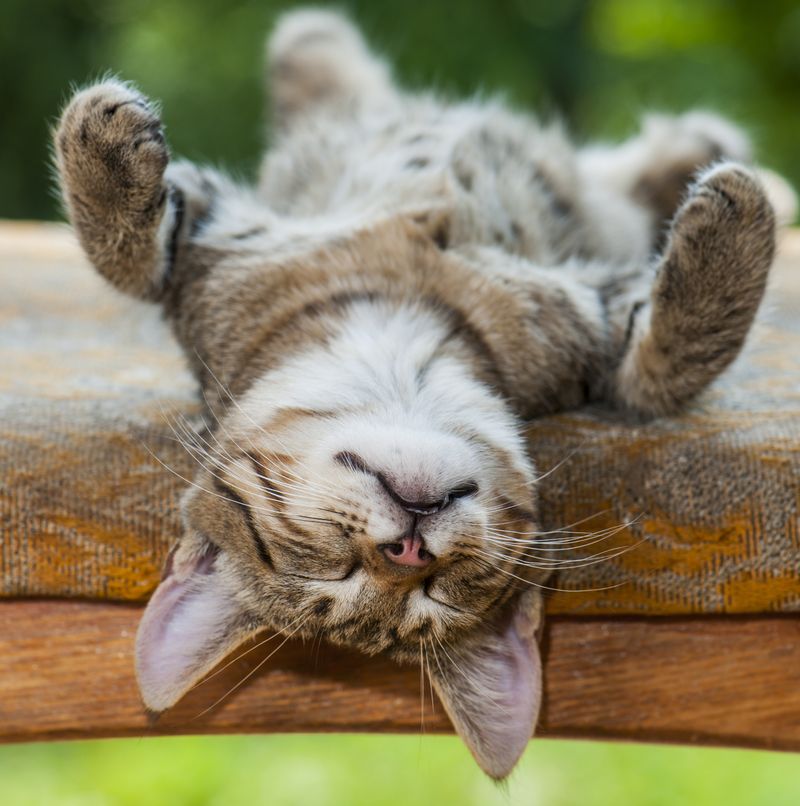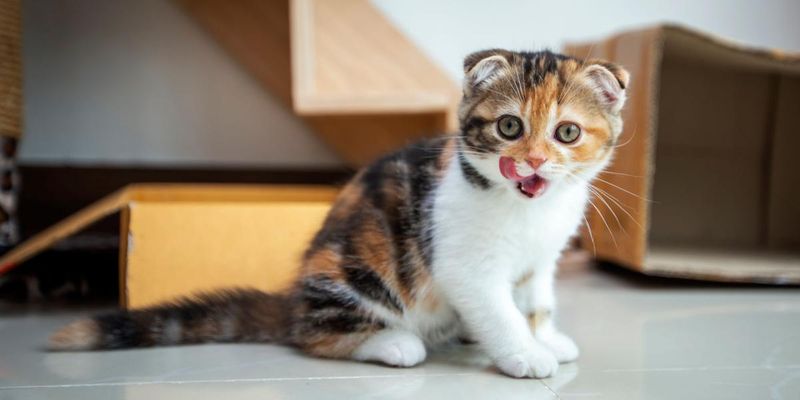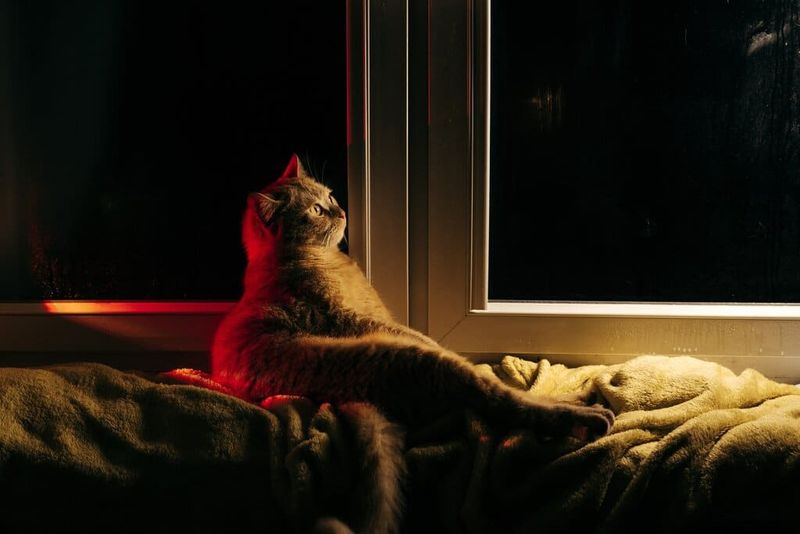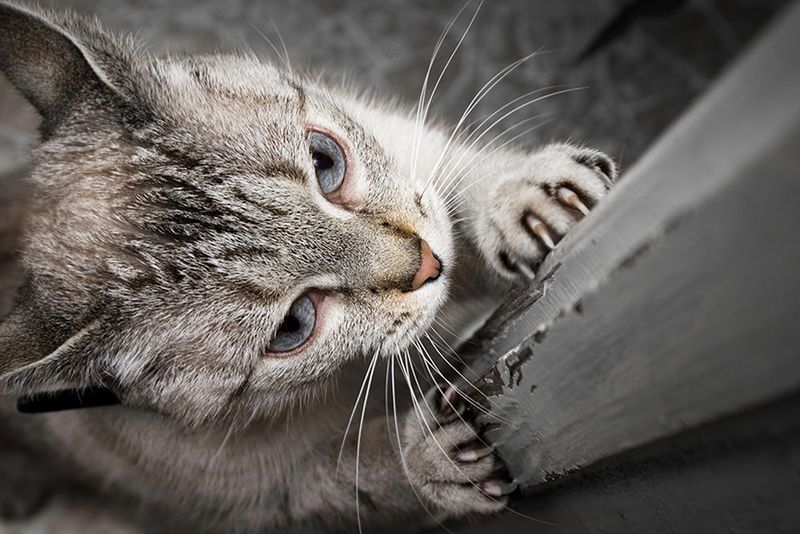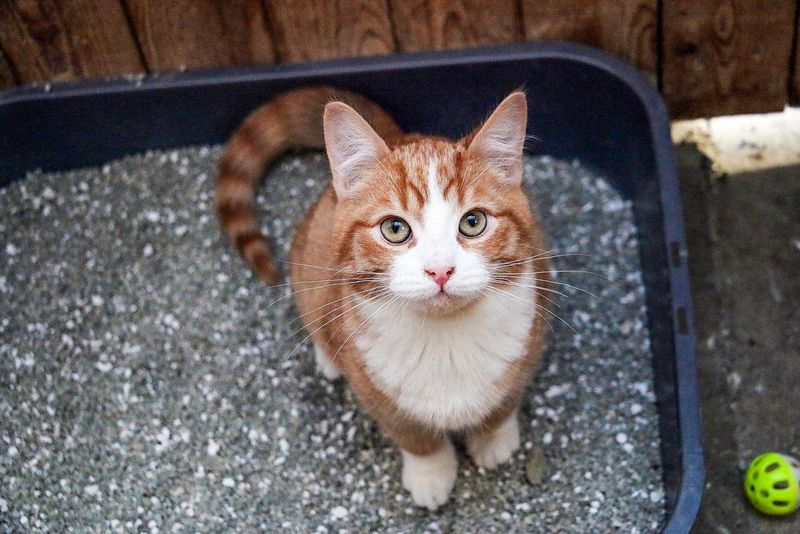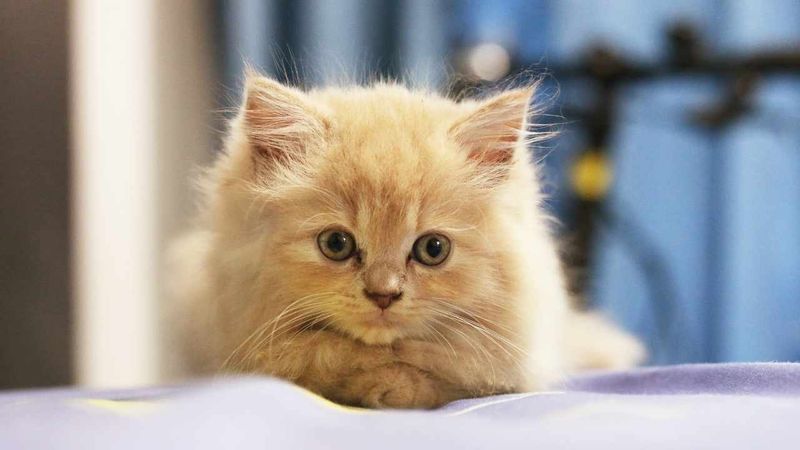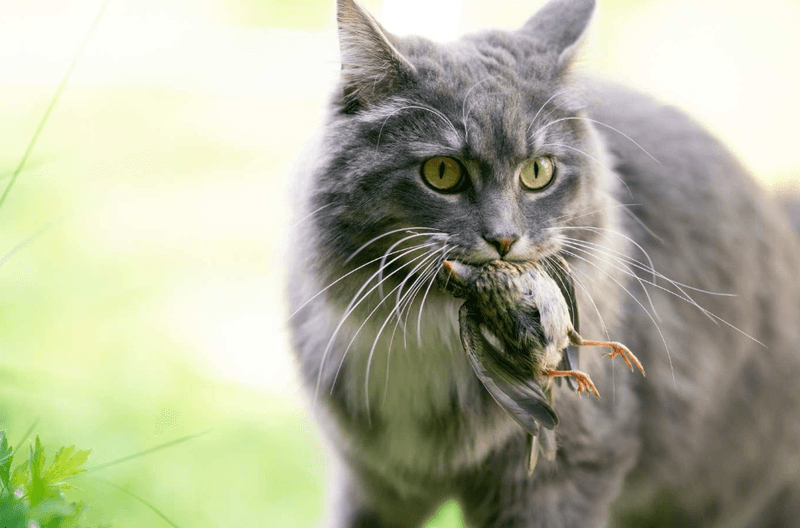📖 Table of Content:
Sharing a home with a cat adds a unique rhythm to everyday life. Their presence can be soothing, offering quiet companionship during moments of stress or sadness. At the same time, their independence and unpredictability bring a layer of surprise to the routine.
Felines have a special way of sensing emotions and often offer comfort without being asked. Their purring, gentle presence, and calm demeanor can ease anxiety and lift moods. This emotional support is one reason why so many people find life with cats deeply fulfilling.
However, their behaviors aren’t always easy to manage. Sudden mood shifts, selective affection, and a tendency for mischief can challenge even the most patient cat lovers. These moments of frustration are part of the package—but they often come with lessons in patience, empathy, and understanding.
1. Purring Therapy Sessions
The rhythmic sound of a cat’s purr works like natural medicine for your brain. Studies show these vibrations, ranging from 25 to 150 Hz, can lower stress hormones and blood pressure when your furry friend curls up on your lap.
Cat owners often report feeling calmer after just a few minutes of petting their purring companions. The gentle rumble creates a meditative atmosphere, helping your racing thoughts slow down after a busy day.
This natural sound therapy costs nothing but delivers powerful relaxation benefits. Many cat parents consider these purring sessions more effective than expensive stress-relief products or apps.
2. Routine-Building Buddies
Cats thrive on schedules and can help establish healthy daily patterns. When your feline expects breakfast at 7 AM sharp, you’ve got a living alarm clock that won’t let you oversleep, creating structure in your day.
Regular feeding times, litter box cleaning, and play sessions form anchors throughout your day. These small responsibilities provide purpose and accomplishment, especially valuable during difficult mental health periods.
Many therapists recommend pet care as a gentle way to maintain daily functioning during depression. Your cat’s needs remain constant, offering stability when other aspects of life feel overwhelming.
3. Unconditional Affection Providers
Unlike many human connections, the bond with a cat is refreshingly unconditional. Titles, appearances, and social standing mean nothing to them. What matters most is the comfort and trust you share.
This pure acceptance creates a safe emotional space where you can be completely yourself. After facing criticism or rejection in the outside world, coming home to a cat who greets you with affection can restore your emotional balance.
Research shows that petting animals releases oxytocin, the bonding hormone, in both humans and pets. This chemical reaction helps fight loneliness and builds a genuine emotional connection that boosts self-worth.
4. Mindfulness Teachers
Living in the moment comes naturally to cats. When they play or observe the world outside, their attention is complete. These small behaviors remind us what true presence looks like.
Their focused attention on simple pleasures offers a powerful lesson. Cat owners often find themselves pausing their busy thoughts to join their pets in appreciating small joys—sunbeams on the floor, the smell of fresh air, or the comfort of a soft blanket.
This feline-inspired mindfulness reduces anxiety about the future and regrets about the past. Your cat becomes an unintentional meditation guide, showing how to find peace in ordinary moments.
5. Laughter-Inducing Entertainers
With spontaneous leaps, exaggerated expressions, and chaotic bursts of energy, cats are daily entertainers. From over-the-top reactions to harmless objects to racing through the house at 2 a.m., their antics never fail to amuse.
These natural comedy moments arrive when you least expect them. A playful cat can transform a gloomy day with their ridiculous behaviors, providing entertainment that requires no screens or subscription fees.
Cat videos dominate internet content for good reason—their humor transcends language and cultural barriers. Having your own live-in comedian ensures regular doses of laughter, which medical research confirms improves mental and physical health.
1. 3 AM Wake-Up Calls
Sleep deprivation becomes a familiar companion when your cat decides dawn starts at 3 AM. Those gentle paws on your face or that persistent meowing next to your ear shatter any chance of completing a full sleep cycle.
Your feline’s nocturnal energy bursts often include racing across your bedroom, knocking items off nightstands, or practicing Olympic-level jumping directly on your bladder. Attempts to ignore these wake-up calls typically result in escalating behaviors until you surrender.
Long-term sleep disruption affects mood, concentration, and overall mental health. Cat owners often become experts at functioning on fragmented sleep, developing a love-hate relationship with their furry alarm clocks.
2. Furniture Destruction Specialists
Watching your expensive couch slowly transform into frayed fabric strips tests even the most patient cat parent. Despite providing multiple scratching posts, many cats insist your furniture offers superior claw-sharpening satisfaction.
The psychological impact extends beyond mere annoyance. Each new scratch represents a small financial loss and creates a constant battle between loving your pet and protecting your possessions. Your decorating choices now revolve around “scratch-resistant” materials rather than aesthetic preferences.
Cat owners develop creative solutions like strategic furniture placement, protective covers, and distraction techniques. The ongoing furniture chess match becomes part of daily life, requiring acceptance that perfect home decor and cats rarely coexist peacefully.
3. Litter Box Landmines
Cat bathroom habits create unique challenges that dog owners never face. Finding scattered litter tracked throughout your home becomes a daily treasure hunt, with granules appearing in mysteriously distant locations.
The unmistakable aroma when your cat uses their box minutes before guests arrive tests your hospitality skills. Even with religious scooping and premium odor-control products, perfect litter management remains elusive.
Litter box location becomes a complex household negotiation. Too hidden, and your cat might protest with inappropriate elimination. Too visible, and your living space feels dominated by pet waste management. This balancing act represents one of cat ownership’s most patience-testing aspects.
4. Selective Hearing Syndrome
Their hearing? Flawless—just not when it comes to you calling them. Say their name and they vanish, but open a treat bag and they appear like magic. It’s selective listening at its finest.
Training attempts often lead to questioning your own sanity. Your cat perfectly understands “dinner time” but develops instant amnesia when hearing “get off the counter.” This selective comprehension creates a one-sided relationship where you follow their schedule rather than vice versa.
The psychological impact of being consistently ignored by a creature dependent on you creates a unique frustration. Cat owners develop elaborate strategies to outwit their pets, only to discover cats have already anticipated and countered these plans.
5. Gift-Giving Hunters
Nothing tests your composure like stepping barefoot onto a half-eaten mouse “gift” in your kitchen. Indoor-outdoor cats proudly present hunting trophies, expecting praise for their natural predatory skills.
These unexpected presents appear at inconvenient times—during breakfast preparation, while hosting dinner guests, or middle-of-the-night bathroom trips. The psychological conflict between appreciating your cat’s natural instincts and horror at dead creatures in your living space creates unique stress.
Cat owners develop lightning-fast reflexes for intercepting incoming “gifts” and learn to check shoes before wearing them. The mixture of disgust and gratitude becomes a strange emotional cocktail that only fellow cat parents truly understand.
